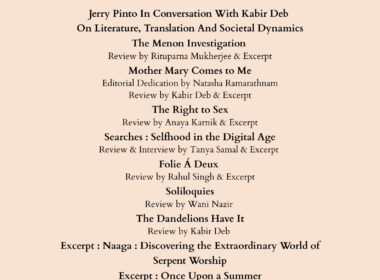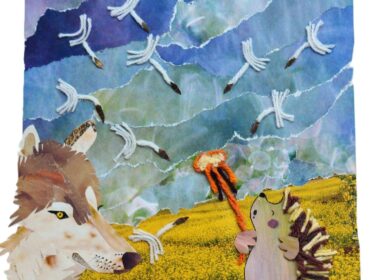Excerpt: On the Banks of the Pampa | Volga | Translated by Purnima Tammireddy

Pages 30 – 31
‘All of you are anagarik. There’s no meaning to your lives. You don’t have houses, backyards or highways. You don’t know how to till land and harvest crops. You aren’t animals, but your lives are hardly different from theirs. If you accept our offer of friendship, we’ll give you land and teach you cultivation. We’ll build your houses for you. Go ahead and cut all the trees in this forest. Flatten the land. We’ll ensure you get your fair share of it. But the decision of how much each one of you will get lies with us. We’ll provide you with food while you work for us. You lot aimlessly roam the woods because you have no work. You aren’t disciplined. You eat whatever you see hanging from a tree. You starve on days when you can’t find any food. We’ll teach you how to preserve and store for your rainy days. We’ll show you what nagarikata in its finest form looks like.
‘To be honest, the food shortage we’re facing isn’t as acute, but it will become worse in the next decade or so. We had anticipated the possibility of such a reality. We aim to extend our city into this forest and convert it into arable land. You don’t know how to preserve anything. You don’t know what wealth is. Nagarikata is nothing but the art of mastering these. If you cooperate with us, we’ll give you special status as our subjects and govern you. Imagine what a great honour and privilege it’d be for folks like you. Should you opt not to support us, it’s no matter.
We wouldn’t hesitate to wipe you off the face of the forest for good. Don’t doubt our claims of possessing countless weapons, nor our clan’s exceptional talent in crafting new ones. We’re trained in numerous combat techniques. Weapons are the sole means to defend a civilization. Yours are laughable—scarcely fit to even hunt down a tiger!’
The tribals found it hard to remain calm and level-headed in the face of these provocative words. Yet, they managed to respond as gently as possible.
‘Why would we hunt tigers? If we don’t hunt, why would we need better weapons? We do possess the skills and tools to defend ourselves. We know how to live without needing yours. We have access to abundant food—Mother Forest bestows upon us all that we need to survive. We’re content with our lives. Why would we want to destroy our forest, our home? Stop trying to convince us with your foolish words and return to where you came from.’
The tribal representatives went back to their homes and had another round of discussions with a larger gathering about the exchange they had had with the nagaravasis. All present were appalled and furious, except Kannudu, who was terrified. He could not disregard the experiences of his father. The old man was well aware of not only the cities but also of the state, or rajyam. Was his life as a slave in the city forgettable by any means?
Pages 66 – 67
As Sabari narrated the incidents to Sutapa, Kabanda lost himself in the story yet again. No matter how often it was told, it was a story that left the listeners wanting more. Sabari snapped out of the past and returned to the present, but Sutapa was reluctant to come out of the incredible story.
‘Amma, have you been living in the forest since then? You seem to embody the very grandeur of the forest inside you! We’re too immersed in city life. You’ve become a part of this forest.’
Sabari smiled gently, like the leaves of the sacred fig tree rustling. She, too, was unwilling to end this conversation.
‘Yes, Sutapa. From that day onwards, our lives became inseparable from the forest. Matanga Muni, too, realized the futility of the desire to undertake penances, pursue jnanam and mingle with nagariks. Under his tutelage, I also pondered deeply about nagarikata, anagarikata,
jnanam and ajnanam. I also came to realize that the very nagarikata which nagaravasis and those hungry for power proclaim as something indispensable for humanity, is, in essence, contemptible. As it was my own experiences that helped me gain this deeper understanding, there was no space for doubt. I could comprehend the multitude of ways in which nagarikata separates mankind from nature. The ways of being uncivilized weren’t hard to grasp either. I learnt about them and chose to be a part of anagarikata. At every given opportunity, I explain my stance on anagarikata to my fellow folks and visitors, but gently, not in the manner of arguments and debates. I am not a preacher either.
‘I advise everyone to befriend nature, hug trees, treat every being as an equal. I recommend a way of life that fosters nothing but love and compassion. Stop this relentless pursuit of the universe’s buried secrets. Instead, learn to listen to its whispers. Our existence will find its true meaning if we develop a keen ear for the subtle murmurs of the universe. Our life’s ambition must be to recognize and revel in its mysteries, without an urge to unravel them. The universe is here to awe us. After a while, once you overcome being awed, you will witness this cosmic play in an impersonal, passionless way, only to become a part
of it. This is the act of intimately fusing with the light of ajnanam. I’m encouraging you to immerse yourself in the sadhana of such ajnanam.
VOLGA is a writer, critic, translator and poet, who has been a forerunner in introducing a feminist perspective into the literary-political discourse of the Telugu-speaking states. One of the most significant figures in Telugu literature today, her works opened the floodgates for a host of women writers to articulate the doubts and confusions they experienced as women. Her novel Sveccha (Freedom) marks a watershed in women’s writing in Telugu and is now being published in all Indian languages by the National Book Trust of India. Her other works include the short-story collection Rajakiya Kathalu (Political Stories), that looks at the oppression of and control on a woman’s body; Maaku Godalu Levu (We Have No Walls), the first volume in feminist philosophy in Telugu, which she edited; and an anthology of feminist poems, Neeli Meghalu (Dark Clouds), also one she edited. She co-authored Saramsam, which documents the anti-arrack struggle, and Mahilavaranam (Womanscape), a detailed collective biography of important Telugu women of the twentieth century.

Purnima Tammireddy is a writer, translator and publisher, working in both Telugu and English. She was a writer-in-residence at the 2022 Sangam House International Writer Residency. She has translated into Telugu Manto’s Siya Hashiye and Amrita Pritam’s Pinjar. Her English translation of the memoir of Mallu Swarajyam, the leader of the Telangana Peasants’ Armed Struggle, is forthcoming. She is also the author of the short-story collection, Emotional Pregnancy.
In 2022, Purnima founded Elami Publications, an independent Telugu publishing house, and co-founded pustakam.net, a website for book reviews, in 2009. A techie by profession, she currently lives in Bengaluru.





